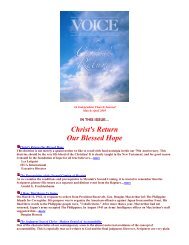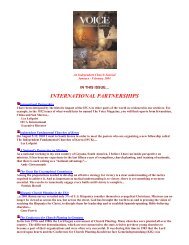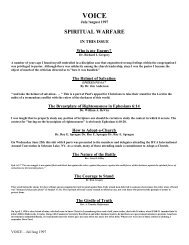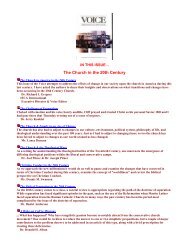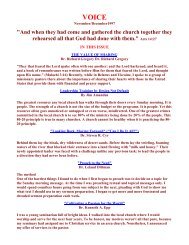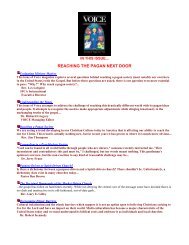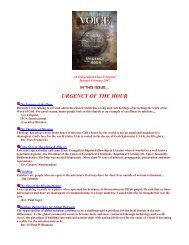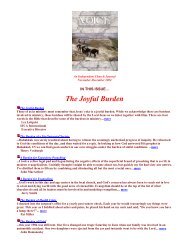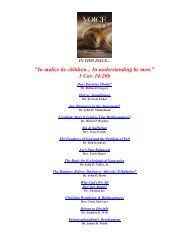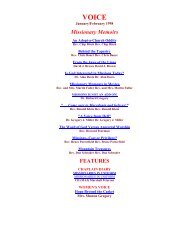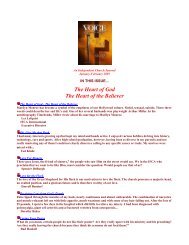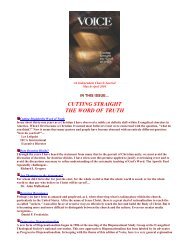IFCA REGIONAL LEADERS' HANDBOOK - IFCA International
IFCA REGIONAL LEADERS' HANDBOOK - IFCA International
IFCA REGIONAL LEADERS' HANDBOOK - IFCA International
You also want an ePaper? Increase the reach of your titles
YUMPU automatically turns print PDFs into web optimized ePapers that Google loves.
to The Independent Fundamental Churches of America in a motion offered by<br />
Dr. J. Oliver Buswell, president of Wheaton College. By this time a new<br />
Constitution and a more comprehensive doctrinal statement had been prepared<br />
and were adopted unanimously. The former magazine, The Pioneer of a New Era<br />
was renamed VOICE - An Independent Church Journal.<br />
A TIME TO STAND FIRM ON FOUNDATIONS<br />
"Has the time come for Fundamentalists to promptly and literally obey the<br />
emphatic commandment given to believers in II Cor. 6:14-18; Eph. 5:11 and II<br />
John 9-11?" This question was asked in the Moody Monthly for February, 1930.<br />
The inception of the <strong>IFCA</strong> four months later was an affirmative answer and by<br />
1940, there were 665 members of <strong>IFCA</strong> and by 1950, there were 1,067 members.<br />
(This question in Moody Monthly also led BIOLA University historian, Dr. J. O.<br />
Henry to title his 1983 History of the <strong>IFCA</strong>, For Such a Time as This. )<br />
The new name, <strong>IFCA</strong> <strong>International</strong>, adopted in 1996, reflects the world-wide<br />
missionary vision and the increasing number of individual members serving in<br />
foreign lands. But it also contains the historical significance of the original name.<br />
"F" (Fundamental) indicates that the movement stands firmly upon "the<br />
foundation of the apostles and prophets, Christ Jesus Himself being the chief<br />
corner stone" (Eph. 2:20). "I" (Independent) and "C" (Churches) speak of the<br />
nature of the fellowship not being a "church" as a denomination, but comprising<br />
individual bodies of believers controlled by the Head of the church through the<br />
Holy Spirit. The Articles of Faith and Doctrine are essentially the same as at the<br />
beginning. The only changes are to strengthen or clarify them. They include the<br />
cardinal beliefs of the historic biblical Christian faith and those Scriptural<br />
principles necessary to jointly participate in the Lord's work. It is outstanding<br />
among such statements of various Christian organizations, providing a sure<br />
foundation for this fellowship of biblical churches and ministries.<br />
A TIME TO STAND FIRM BY OCCUPATION<br />
Jesus said, "Occupy [do business (NKJV)] till I come." (Luke 19:13). The primary<br />
occupation of the independent local church is to proclaim the Gospel and to<br />
foster Scriptural Christian living. But this applies to world-wide outreach as well<br />
to the home field.<br />
The early churches set the example by being interdependent as well as<br />
independent. They circulated the Scriptures and extended assistance to one<br />
another in times of need. <strong>IFCA</strong> <strong>International</strong> provides for such activity. There are<br />
many national benefits of interdependence as seen throughout the pages of this<br />
issue of the Voice.<br />
But if <strong>IFCA</strong> <strong>International</strong> was to continue its growth, it had to do more than<br />
15<br />
<strong>IFCA</strong> <strong>International</strong> Regional Leadership<br />
Handbook



